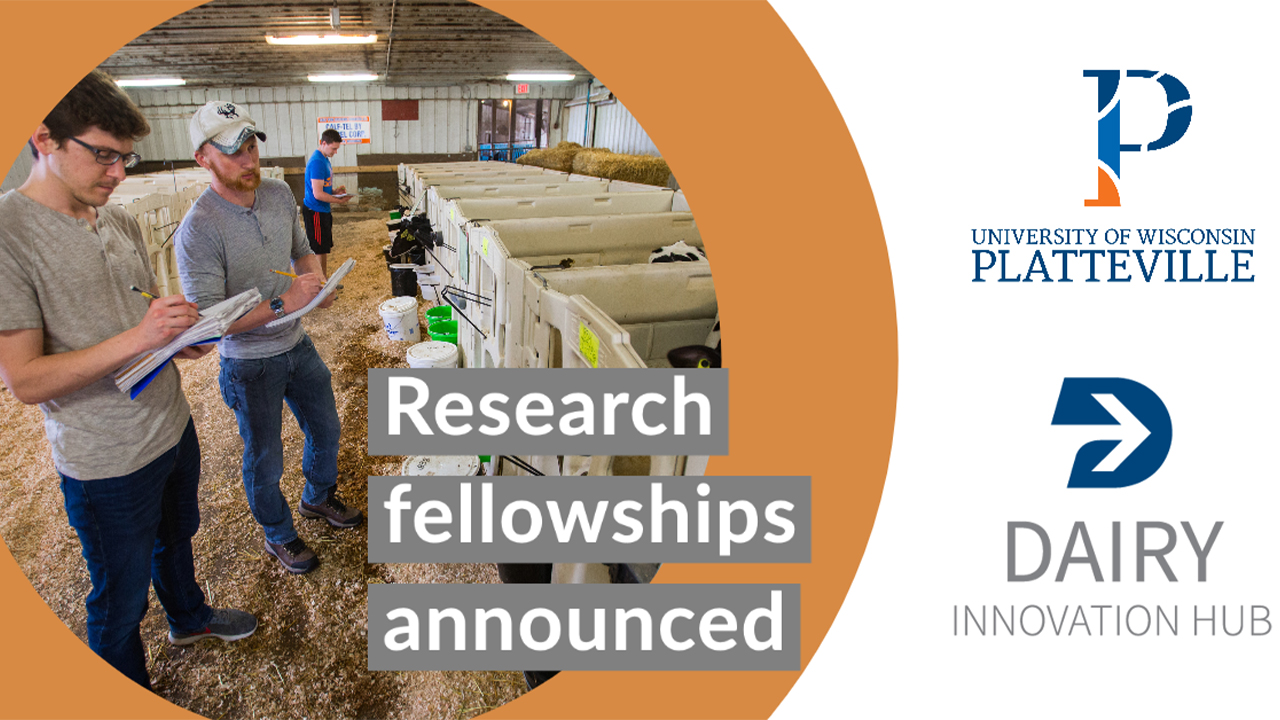
The University of Wisconsin-Platteville recently awarded six faculty research fellowships to increase dairy-related research capacity through the Dairy Innovation Hub initiative. Known as the Dairy Industry Impact Innovation Faculty Fellowships, or “DI3 Faculty Fellowships,” the selected faculty members will tackle research projects in the Hub’s four priority areas: stewarding land and water resources; enriching human health and nutrition; ensuring animal health and welfare and growing farm business and communities.
Funded through a $7.8 million per year investment by the state of Wisconsin, the Hub harnesses research and development at UW-Platteville, UW-Madison and UW-River Falls campuses to keep Wisconsin’s $52.8 billion dairy community at the global forefront in producing nutritious dairy foods in an economically, environmentally and socially sustainable manner. Since its launch in 2019, the Hub has funded more than 230 projects across the three campuses.
A faculty research fellowship is a temporary position for permanent faculty members. The goal is to provide support for a specific research project and any ancillary costs — including ensuring that the faculty member will have time to conduct the research and support for existing teaching responsibilities.
The following UW-Platteville faculty fellows were selected for funding:
Rich Crow, School of Agriculture
“Increasing nutritional density of alfalfa through the application of locally sourced effective microorganisms”
Crow is an assistant professor in the School of Agriculture with a background in agronomy and agricultural education. His study, “Improving the nutritional quality of alfalfa using locally-sourced effective microorganisms (LEMs),” investigates how LEMs can enhance the availability of key nutrients—such as calcium, magnesium and zinc—in alfalfa, a vital feed crop for Wisconsin’s dairy industry. By promoting soil biodiversity and nutrient cycling, this research aims to reduce the need for synthetic feed additives while increasing the nutritional value of homegrown forage. Ultimately, the project offers dairy farmers a more sustainable and cost-effective way to support herd health and productivity through improved feed quality. Read full profile
Joseph Sanford, School of Agriculture
Sanford, an assistant professor in the School of Agriculture, will manage two research projects in this cohort of Dairy Innovation Hub-funded research:
Sanford’s first project is phase two of “Evaluating nitrogen availability from solid-liquid-separated and composted manure.” Specializing in agricultural wastewater management and nutrient cycling, Sanford is expanding on previous lab-based research to assess how processed manure performs under real field conditions. Early findings revealed that current nutrient guidelines may underestimate nitrogen availability in treated manure, potentially impacting crop productivity. This next phase will test those findings on farms, providing more accurate data for nitrogen application and supporting development of sustainable manure management strategies that benefit both the environment and the dairy community. Read the full profile
Sanford’s second project, “Impact of biochar on composting dairy manure and soil health: a comparative study,” explores how adding biochar to dairy manure composting systems can improve manure management and soil health. The research focuses on comparing different biochar sources and pyrolysis temperatures to evaluate their effects on compost quality—specifically nutrient retention, organic matter stability and microbial activity. With Wisconsin recently adopting NRCS Conservation Practice Standard 336 to support soil carbon amendments, this work is especially timely for farmers looking for sustainable solutions. By identifying the most effective biochar-compost combinations, Sanford aims to produce high-quality compost that speeds up decomposition, builds soil resilience and reduces environmental impacts—offering practical benefits for the state’s dairy farmers. Read the full profile.
Muthu Venkateshwaran, School of Agriculture
“Lab to land: testing the efficacy of plant essential oils for the management of Aphanomyces root rot of alfalfa in the field”
Venkateshwaran is a professor of crop physiology and plant molecular biology focusing on plant-microbe interactions, plant disease management, and sustainable agriculture. His field-based study “Lab to land: testing the efficacy of plant essential oils for the management of Aphanomyces root rot of alfalfa in the field,” explores the use of plant-derived essential oils as a sustainable, environmentally friendly solution to disease management. By evaluating how essential oils can improve plant health and resilience in real-world farm settings, this research could offer farmers a natural, sustainable tool to protect yields and support long-term crop viability. Read the full profile
Zifan Wan, School of Agriculture
“Improving the growth of alfalfa with plasma activated water: a potential eco-friendly pesticide”
Wan is an assistant professor of animal, dairy and veterinary sciences specializing in dairy food science and management. Her study, “Improving the growth of alfalfa with plasma-activated water: a potential eco-friendly pesticide,” focuses on enhancing alfalfa growth and resilience using a sustainable, non-chemical approach. The research investigates whether plasma-activated water (PAW) can serve as an eco-friendly alternative to traditional pesticides. Alfalfa, a key feed crop for Wisconsin’s dairy farms, is susceptible to pests like the alfalfa weevil, which can significantly reduce yields and drive-up feed costs. By boosting the plant’s natural defenses, PAW has the potential to protect crops while preserving soil and water health—offering dairy farmers a safer, more sustainable method of crop protection and contributing to the long-term viability of the dairy community. Read the full profile
Yanwei Wu, Department of Computer Science and Software Engineering
“Leveraging blockchain for data security in the dairy farm – phase two”
Wu, an associate professor of computer science and software engineering and a specialist in cybersecurity, is leading phase two of the “Leveraging blockchain for data security in the dairy farm” project. Building on earlier findings from UW-Platteville’s Pioneer Farm, the project addresses critical challenges in managing the vast and fragmented data generated by modern dairy farms. This phase focuses on cleansing, unifying and restructuring farm data to support the development of a secure, blockchain-based framework that enhances data security, enables advanced analytics and AI applications and improves operational efficiency. The research serves as a scalable model for the dairy community and offers students valuable hands-on experience while growing UW-Platteville’s leadership in agricultural innovation. Read the full profile.
The full release is posted online at: https://dairyinnovationhub.wisc.edu/2025/07/21/uw-platteville-announces-six-faculty-fellowships-funded-by-state-sponsored-dairy-innovation-hub/
Contact: Maria Woldt, Dairy Innovation Hub program manager, (608) 265-4009, maria.woldt@wisc.edu